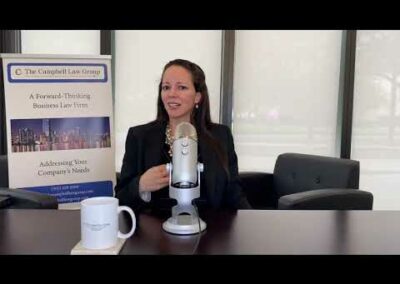Employees should be one of your company’s greatest assets. They are the backbone of your operations, helping you to achieve your goals and meet the needs of your customers. However, employees can also pose significant risks to a company, both in terms of finances and reputation. In fact, at times, an employee can become the company’s greatest liability and even expose management and owners to personal liability.
As a Florida business owner, it’s essential to take steps to mitigate the risks that employees can pose to your company. While it’s impossible to avoid all lawsuits, there are measures you can take to reduce your risk and protect your business.
One of the most effective ways to mitigate your risk is to understand employment laws. Florida has a comprehensive set of employment laws that businesses must comply with to avoid legal issues. These laws cover a wide range of issues, including minimum wage, discrimination, and workplace safety, to name a few.
By staying informed about these laws, you can ensure that your company is in compliance and avoid any legal repercussions. Another crucial step to mitigate your risk is to have clear and comprehensive employment policies and procedures in place. These policies should cover all aspects of employee behavior and expectations, including but not limited to anti-discrimination, anti-harassment, and health and safety guidelines.
Florida Employment Law Attorney-Employer Representation
While it is impossible to completely avoid lawsuits, you must take steps to mitigate your risk. The Campbell Law Group can provide diligent and effective representation for your company in an employment law lawsuit and assist in developing legal strategies that align with your business’s needs and minimize the risks.
The Campbell Law Group provides an array of services that cater to the employment law needs of businesses. Our services include:
Employment Law Litigation
- Claims under the Fair Labor Standard Act (“FLSA Lawsuits or claims“) such as:
- unpaid wages;
- overtime claims;
- improper salary/exemption status;
- improper categorization of employees as independent contractors;
- retaliatory discharge
- Breach of Employment Agreement Litigation
- Breach of Fiduciary Duties Litigation
- Non-Compete Litigation
- Non-Solicitation/Confidentiality Agreements Litigation
- Executive Compensation Litigation
- Misappropriation of Trade Secrets Litigation
- Unauthorized access of Company’s computers Litigation
- Tortious Interference Litigation
- Conspiracy Litigation
- Conversion Litigation
- Civil Theft Litigation
- Fraud Litigation
- Misrepresentation Litigation
- Temporary and Permanent Injunctions Litigation
Employment Law Transactional
- Employment Agreements
- Independent Contractor Agreements
- Non-Compete Agreements
- Non-Solicitation Agreements
- Employee Handbooks
- Company Policies
- Intellectual Property agreements to protect your internal documents, processes, and information
- Exit Interviews
- Audit and Assessment tools to ensure compliance with all Federal, State, and Local Laws
Navigating employment law can be a complicated and nuanced process. Companies should seek expert legal counsel to ensure they are properly represented and prepared in the event of a lawsuit.
Our law firm has extensive experience in this area and serves clients throughout the entire state of Florida. Whether your company is based in Florida or spans multiple states or countries, including Florida, we can provide guidance and support to ensure your employment agreements adhere to state law and protect your company’s interests. Let us put our knowledge and expertise to work for you.
Frequently Asked Questions
What is employment law?
Florida employment law refers to the specific regulations and laws that govern the employer-employee relationship in the state of Florida. These laws cover various aspects of the workplace, including minimum wage, overtime pay, discrimination, harassment, and employee benefits. Employers in Florida must comply with both federal and state employment laws to ensure that their business practices are in accordance with the law.
What are the federal employment laws that apply to my business?
Your Florida-based business may be subject to several federal employment laws, such as the Fair Labor Standards Act (“FLSA”), the Family and Medical Leave Act (“FMLA”), the Americans with Disabilities Act (“ADA”), and Title VII of the Civil Rights Act. It is important to determine which laws apply to your business and ensure that you are in compliance with their requirements. Working with an experienced employment law attorney can help you understand your obligations and avoid costly legal disputes.
Can I terminate an employee without cause?
In Florida, like most states, employment is considered “at-will,” which means that an employer can terminate an employee without cause as long as it is not discriminatory or in violation of a contract. However, there are some exceptions to this rule, such as when an employee has an employment contract or is protected by a specific law. Employers need to understand their rights and obligations under the law and work with an employment law attorney to ensure compliance.
Can my employees sue me if they feel they have been discriminated against?
Employees in Florida have the right to sue their employer if they feel they have been discriminated against. The Florida Civil Rights Act applies to employers with 15 or more employees and protects employees from discrimination based on protected characteristics such as:
- Race
- Color
- Religion
- Sex
- Pregnancy (including childbirth and related medical conditions)
- National origin
- Disability
- Age
- Marital status
In Florida, it is prohibited to discriminate against an individual who
- has or is perceived to have acquired immune deficiency syndrome (AIDS) or human immunodeficiency virus (HIV)
- has the sickle-cell trait
What are some common employment law mistakes made by businesses?
Some common mistakes include misclassifying employees as independent contractors, improperly classifying employees as exempt or non-exempt under the FLSA, failing to document employee performance issues, and not providing reasonable accommodations to employees with disabilities.
What are the potential penalties for my business?
The potential penalties for a business if an employee files an employment law case can vary depending on the specific circumstances of the case and the laws that were violated. Generally, penalties may include back pay, front pay, compensatory and punitive damages, injunctive relief, and attorney’s fees and costs. In some cases, a business may also be subject to civil penalties or fines. Additionally, depending on the severity of the violation, a business may face negative publicity and damage to its reputation. It is important for businesses to take any employment law cases seriously and seek legal counsel to ensure compliance with all applicable laws and regulations.
How can I ensure my company complies with employment laws?
To ensure compliance with employment laws in Florida, employers can partner with experienced employment law attorneys who can provide guidance on relevant laws and regulations, assist in developing policies and procedures, and ensure compliance.
What should I do if an employee files a complaint against my company?
When an employee files a complaint against a company, employers need to take it seriously and investigate it thoroughly. It is recommended that they seek the guidance of an experienced employment law attorney to ensure that their response is appropriate and complies with all applicable laws.















